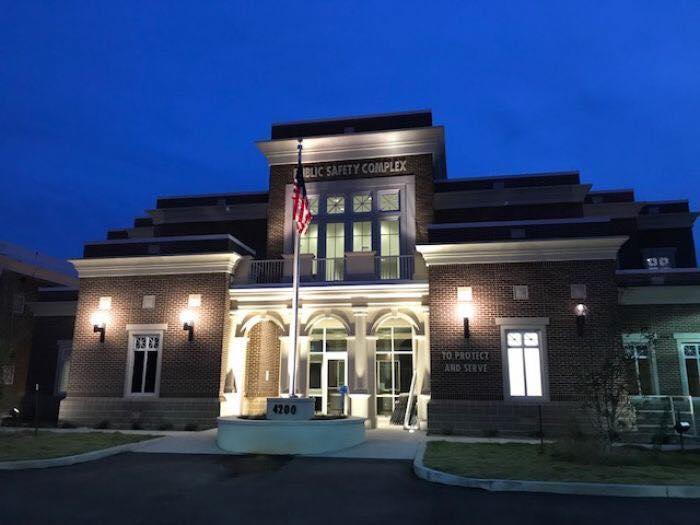
(Image from Intellisafe website)
- A 2009 law prohibited cities from installing automated traffic cameras to ticket drivers. A Coast attorney is now seeking to prevent the use of handheld cameras.
Mississippi law prohibits county and municipal governments from “installing” cameras to automatically detect traffic violations. It does not explicitly address whether officers holding a camera to manually detect violations is prohibited.
In early July, the Moss Point Police Department announced that their officers would begin using new hand-held radar cameras to detect traffic violations. The devices record drivers and vehicle license plates. Violators are then mailed a ticket. This allows officers to ticket multiple violators in a short span without having to conduct traditional traffic stops.

Moss Point Police Chief Brandon Ashley told WXXV the images from the hand-held cameras are uploaded to a database.
“So, it’s more efficient, more safe for everyone involved,” Chief Ashley said. “This gives us a tool to increase the traffic enforcement productivity and efficiency of one officer out there writing tickets and slowing people down.”
According to Intellisafe, the company supplying Moss Point with the new technology, a traffic study conducted prior to the use of the new cameras showed that 87% of drivers along Main Street and McInnis Avenue were exceeding the 30-mph speed limit during the study period.
The company’s technology is currently also in use in Hattiesburg under a pilot program aimed at reducing school zone speeding. Over a four-week period in two local school zones – Woodley Elementary and Grace Christian Elementary – Hattiesburg Police issued 703 traffic citations, according to a May report from WDAM.
Mark Dunston, a former Police Chief in Ocean Springs and now a partner with Intellisafe, said the technology aids in enhancing public safety both for law enforcement and the public.
“What we’ve learned in other cities, specifically Hattiesburg, is that there’s been a significant reduction in speeding in the areas they’re using our LiDAR gun,” Dunston told Magnolia Tribune. “Every police department everywhere is extremely shorthanded these days. So, it’s a force multiplier where it would take one officer working a speed zone or school zone writing maybe 3 or 4 tickets, maybe 5 an hour because it takes about 10 to 15 minutes to pull someone over, interact, run the information, write the ticket and get over with the traffic stop. With our device, it’s unlimited.”
Dunston said while the officer is operating the device, there is zero danger since they avoid a traffic stop, one of the main interactions where law enforcement is at an elevated risk for injury or death.
“There is also no negative interaction for the driver, no confrontation. There’s zero chance for a pursuit,” Dunston added, noting that many dangerous pursuits start as a simple traffic stop.
Lawsuit Filed Challenging Moss Point Cameras
Soon after Moss Point implemented the technology, residents and visitors alike began receiving traffic violation notices. The tickets caught many by surprise, according to attorney David Carson Futch.
Futch told Magnolia Tribune that over 40 people have contacted his office about Moss Point’s use of the traffic cameras. Futch has filed suit in Jackson County Circuit Court seeking an injunction against the city.
Judge Calvin Taylor will hear arguments in the case on September 17th. Taylor is a former municipal judge in Ocean Springs.

Futch, who says he is handling the case pro bono, was stirred to take on the matter because “it scared the citizens, and it scared me into action.”
“I filed an injunction for the court to rule strictly on the legality of the devices with the law,” Futch said. “I assume municipalities who are stretched for more are trying to look at the law and say, ‘Well, it doesn’t say we can’t hold it.’ They’re looking at what it doesn’t say and using that for their advantage.”
Futch said no matter how the cameras are used, whether installed on a pole or operated manually through a hand-held device, he believes the law prohibits their use.
“If I lose, I promise I will try every single case to verdict. Then appeal them. I’ll go to trial on every single one. I want them to prove to me that my client was speeding. Not that the car was speeding, but that my client was operating it,” Futch said.
About the Traffic Camera Law
The traffic camera prohibition law – HB 1568 – was passed in 2009 and signed by former Governor Haley Barbour (R). The legislation was authored by former State Rep. Edward Blackmon (D) and co-authored by Mark DuVall (D).
MS Code § 17-25-19 prevents counties or municipalities from” authorizing the use of automated recording equipment or system to enforce compliance with traffic signals, traffic speeds or other traffic laws.”
The law defines “automated recording equipment or system” as a camera or optical device “installed to work in conjunction with a traffic control signal or radar speed detection equipment or both and designed to record images that depict the license plate attached to the rear of a motor vehicle that is not operated in compliance with instructions of the traffic control signal or the posted speed limit.”
The result of the law was that cities that already had cameras at the time removed them. Those municipalities included Columbus, Natchez, Southaven and Tupelo.
The legislation passed 42-9 in the Mississippi Senate and 111-9 in the Mississippi House of Representatives.
Moss Point’s Response
Counsel for Moss Point declined to comment on the matter, citing pending litigation. However, in court documents the City has argued that the 2009 law does not prevent officers from holding and manually triggering a camera.
“For the statute to have any application whatsoever, besides the fact that it is not automated, the officer using the radar gun would have had to ‘install’ the radar or video device onto his hand. Following the Plaintiffs theory, a baseball player ‘installs’ a baseball glove on his hand. A quarterback ‘installs’ a football into his hand. This defies common sense,” the city argues.
Moss Point also contends that there is no definition in Mississippi cases nor in Black’s Law Dictionary of the term “automation.”
According to an affidavit filed in the case from the Chief Ashley, he states that the “radar detection device and video camera are incapable of being operated without manual engagement. The radar gun could be placed on the hood or the dash of police vehicle and, unless the officer manually engages it for each and every vehicle, the system will not work. In other words, it is not an automated speed detection device.”
Moss Point also cited a 2009 Attorney General opinion following the passage of the statute that sought to answer, “Can a municipality continue to install and operate cameras in police vehicles for enforcement of traffic laws?”
The AG opinion stated that a “municipality can continue to install and operate cameras in police vehicles for enforcement of traffic laws.” The Attorney General further stated, “The use of a camera in a police vehicle is not installed to work in conjunction with a traffic signal or radar designed to depict license plate.”
Beyond Futch’s Case
The outcome of Futch’s case could impact whether other cities implement similar workarounds like Moss Point and Hattiesburg. It could also result in legislative action to clarify the law.
State Senator Brice Wiggins (R) of Jackson County told Magnolia Tribune he foresees citizens making a push to close the loopholes in the 2009 law.

“There’s a saying in both the law and the Legislature that ‘it’s the spirit of the law.’ In all of these cases that I’ve been apprised of, or been made aware of, after the passage of that law, these cities, or whomever is doing it, is trying to get around the spirit of the law,” Wiggins said.










